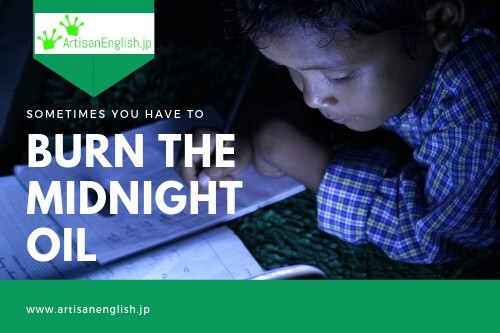
YouTube / iTunes / Spotify / Radio Public / Pocket Casts / Google Podcasts / Breaker / Overcast
Listen to ArtisanEnglish.jp posts & lesson intros here.
Phrase: Burn the midnight oil
There’s a time and a place for everything. When you’re on to something, you need to know when to burn the midnight oil and when to take a breather.
There are only so many hours in a day, and when we burn the midnight oil or continue to work late into the night, we make a sacrifice.
We’re sacrificing sleeping time to work more.
Now, this could be a bad thing, or it could be a good thing.
It all depends on why you are working so late.
Some people need to work while they have an idea in their head.
Writers, for example, will sometimes wake up at three o’clock in the morning with an excellent ending for a chapter of their book.
They know that if they don’t put pen to paper now (or type it into their computer, for the modernists) while the idea is fresh, they won’t be able to do it in the morning.
They have to burn the midnight oil.
I recently created a lesson about Pre-crastination vs Procrastination.
Pre-crastinators like to have things done ahead of time.
Procrastinators, on the other hand, prefer to wait until the last possible minute.
Some of my students are procrastinators.
They tell them they prefer to work under pressure.
It energizes them and causes them to do their best work.
I’m not so sure about that.
They also tell me that they have to burn the midnight oil due to their procrastination.
There’s not much time for sleep with a deadline looming over your head like the Sword of Damocles.
Then there are the crammers.
These people stay up late burning the midnight oil before an exam, trying to cram the final pieces of information into their brains.
I know, and you should know that this doesn’t work.
The brain needs to absorb things over time, with repetition, to achieve long-term retention.
Cramming is good for the lamp oil companies, I suppose.
Flesch-Kincaid Readability Test
This post is understandable by someone with at least a 7th-grade education (age 12).
On the Flesch-Kincaid reading-ease test, this post scores 77.
The easier a passage is to read, the higher the score on a scale of 0 – 100.

